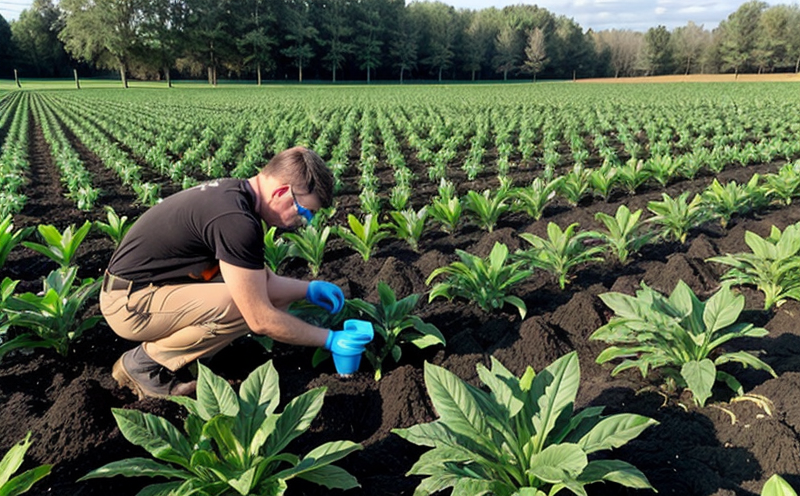Insoluble Residue Testing in Fertilizers
The process of testing insoluble residue in fertilizers is critical for ensuring product quality and compliance with international standards. Insoluble residues, which are components that do not dissolve in water, can impact the efficiency of nutrient delivery to plants. This test ensures that only the soluble portion contributes to plant nutrition, thereby optimizing crop yield and minimizing environmental pollution.
The testing process involves several steps, starting with the preparation of a sample solution by mixing the fertilizer with distilled water. The mixture is then allowed to stand for a specified time period before filtering through a fine mesh filter. The residue left on the filter is carefully collected and dried under controlled conditions. Once dried, the mass of the insoluble residues is determined using precision analytical balances.
The accuracy of this test is paramount in agriculture and forestry sectors where quality control plays a crucial role. For instance, in the production of fertilizers, ensuring that only soluble nutrients are available to plants helps prevent wastage and reduces the risk of nutrient runoff into water bodies, contributing significantly to environmental sustainability.
Compliance with international standards such as ISO 13527 is essential for manufacturers. This standard provides guidelines on determining the percentage of insoluble matter in fertilizers, ensuring consistency across different batches and brands. Compliance not only enhances brand reputation but also ensures that the products meet safety and efficacy requirements.
From a research and development perspective, this test helps R&D teams understand how different formulations affect plant growth. By comparing results from various fertilizer samples, they can identify optimal compositions that balance nutrient availability with environmental impact. For procurement officers, accurate testing of insoluble residues ensures that the company sources only high-quality fertilizers.
The precision and reliability of this test are achieved using advanced analytical instruments such as microbalance scales and filtration units designed to handle minute quantities accurately. The entire process is conducted under strict laboratory conditions to maintain consistency and minimize errors. This level of accuracy is critical in agriculture, where even small differences in nutrient availability can have significant impacts on crop yields.
In summary, insoluble residue testing in fertilizers is a vital component of quality assurance processes in the agricultural and forestry sectors. It ensures that products meet stringent international standards, supports sustainable practices by minimizing environmental impact, and provides valuable insights for research and development activities.
Industry Applications
The application of insoluble residue testing in fertilizers extends beyond the laboratory into various industrial applications. In quality control departments, this test is used to ensure that products meet specified standards before being released for commercial sale. This helps maintain brand integrity and customer satisfaction.
For R&D teams, the insights gained from these tests are invaluable. They help in formulating new fertilizers that not only enhance plant growth but also reduce environmental impact. This aligns with broader sustainability goals within the agricultural industry.
In compliance departments, this testing ensures adherence to regulatory requirements set by governing bodies around the world. Compliance is crucial for avoiding legal issues and maintaining a positive reputation in the market.
For procurement officers, accurate testing of fertilizers helps them choose suppliers who provide reliable and consistent product quality. This leads to better supply chain management and reduced risks associated with substandard products.
Environmental and Sustainability Contributions
The environmental benefits of conducting insoluble residue testing in fertilizers are significant. By ensuring that only the soluble portion contributes to plant nutrition, this process helps minimize nutrient runoff into water bodies. This reduction in pollution is crucial for maintaining aquatic ecosystems and preventing algae blooms which can lead to oxygen depletion.
From a sustainability perspective, optimizing the use of nutrients through accurate testing supports more efficient agricultural practices. This means less waste and lower overall resource consumption, contributing positively towards sustainable development goals.
The results of these tests are not only useful for immediate quality assurance purposes but also serve as historical data that can be used to track trends over time. Over the years, this information could help identify areas where improvements need to be made or changes in environmental conditions have occurred.
Use Cases and Application Examples
| Use Case | Description |
|---|---|
| Quality Control in Manufacturing | Determining the percentage of insoluble matter ensures consistent product quality and compliance with international standards. |
| Research and Development | Identifying optimal fertilizer formulations that balance nutrient availability with environmental impact. |
| Supply Chain Management | Selecting reliable suppliers based on consistent product quality, reducing risks associated with substandard products. |
| Environmental Monitoring | Tracking nutrient runoff and its impact on water bodies to inform environmental management strategies. |
| Regulatory Compliance | Avoiding legal issues by ensuring adherence to regulatory requirements set by governing bodies worldwide. |
| Sustainability Reporting | Incorporating data into sustainability reports to demonstrate commitment to environmental responsibility. |





